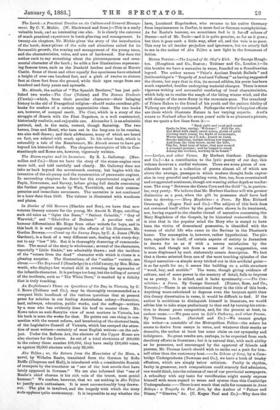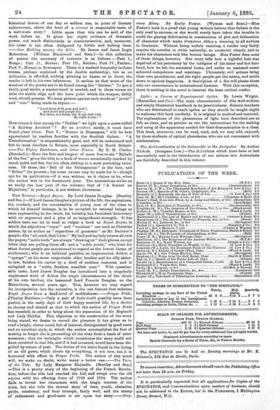Mises PosTRY.—The Legend of St. Olaf's Kirk. By George Hough-
ton. (Houghton and Co., Boston ; Triibner and Co., London.)—In this booklet we have a narrative in verse, founded on a Scandinavian legend. The author names "Prior's Ancient Danish Ballads" and pehlenschlager's "Tragedy of Axel and Valborg " as having suggested the theme, but says that in this, its second edition, his poem has been much expanded, besides undergoing material changes. Therels some vigorous writing and successful rendering of local characteristics, which help us to realise the sough of the biting winter wind, and the- wild charge of the snow-flurry in the mountain-pass. The treachery of Prince Hakon to the friend of his youth and the patient fidelity of Valborg are sharply contrasted. Perhaps the writer's happiest efforts are thotie which illustrate Nature in her varying aspects. Axel's return to Worland after his seven years' exile is so pleasant a picture, that we quote a few lines from it :—
"Each sight and scent and sound Spoke to him saving, 'Welcome ' Still the air, But filled witli small, sweet noises, plaint of galls Circling their young, the flight of cormorauts, Waves lapping on a b aoh ; nearer at hand, Brooks babbling, larches talking low together, And from the vales below, under the hills, The far, faint buzz of labor, that now seemed A peasant pastime ; and he longed to stand
. Among the workers, working to be found."
—Leolyn, and other Verses. By Herbert Gardner. (Remington and Co.)—As a contribution to the lyric poetry of our day, this volume deserves a cordial welcome. There are some pieces of con siderable merit in a collection of poems almost all of which are above the average, passages in which modern thought finds expres- sion in very graceful and sparkling verse, free, too, from overstrained and exaggerated sentiment, though not wanting either depth or tender- ness. The song " Between the Green Corn and the Gold " is, in particu- lar, very pretty. We believe that Mr. Herbert Gardner will win greater distinction as a poet, when the gift he possesses shall have had time to develop.--Mary Magdalene : a Poem. By Mrs: Richard Greenough. (Began Paul and Co.)—The subject of this book does not commend itself either by the good-taste shown in its treatment, nor, having regard to the slender thread of narrative concerning the Mary Magdalene of the Gospels, by its historical vraisemb/ance. It is true that in the popular mind the Mary who is stated to have been the victim of demoniacal possession, is identified with the woman of sinful life who came to the Saviour in the Pharisee's house. The assumption is, however, rather hypothetical. The pic- ture, repulsive in itself, of certain aspects of society in Jerusalem is drawn for us as if with a serene satisfaction by the writer, and though not from a sense of its exaggeration, one is more displeased by such elaborately ornate description. We feel that a theme selected from one of the most touching episodes of the Gospel narrative—a simple story tricked out in this artificial guise— is so far spoilt for us ;• it seems like building on a noble structure "wood, hay, and stubble." The verse, though giving evidence of culture, and of some power in the mastery of detail, fails to impress us as poetry. It is stilted, and it lacks spontaneity.—The Con- solation: a Poem. By George Gerrard. (Hunter, Rose, and Co., Toronto.)—There is an unintentional irony in the title of this book. Anything more-calculated to depress even the buoyant spirit than this dreary dissertation in verse, it would be difficult to find. If the author is ambitions to distinguish himself in literature, we would advise him to take steps preliminary to that end by tinning his atten- tion to decent prose composition, and, for the present at least, to eschew verse.—We pass next to Life's Pathway, and other Poems. By Thomas Leech. (Satchel' and Co.)—We cannot grudge the writer—a constable of the Metropolitan Police—the solace he seems to derive from essays in verse, and whatever their merits or demerits, the author at least has some claim on our sympathy and indulgence. No great results are, perhaps, to be expected from such desultory efforts in literature ; but it is natural that, with such ability as he possesses, and encouraged by the approval of friends and patrons, Mr. Thomas Leech should wish to strike out a path for him- self other than the customary beat.—In Echoes of Song, by a Cam- bridge Undergraduate (Newman and Co.), we have a book of trashy effusions, which are simply below criticism. Faulty in rhythm, faulty in grammar, such compositions could scarcely find admission, one would think, into the columns of one of our provincial newspaper& A schoolboy with any taste for versification might surely express himself with more regard to sense and syntax than this Cambridge Undergraduate.—There is not much that calls for comment in Anne Boleyn : a Tragedy in Five ,Acts, by the Author of "Palace and Prison," " Ginevra," &c. (C. Began Paul and Co.)—Why does the historical drama of our day so seldom. rise, in point of literary achievement, above the level of a résumé in respectable verse of a well-worn story ? Little more than this can be said of the work before us. It gives but slight evidence of dramatic power, not much distinctness in characterisation, and, moreover, the verse is too often disfigured by feeble and halting lines. —Our Holiday among the Hills. By James and Janet Logie Robertson. (William Blackwood and Sons.)—In this collection of poems the summary of contents is as follows :—Part I., Songs ; Part II., Scenes ; Part III., Satires ; Part IV., Psalms ; Part V., Horace in Homespun. There is a marked inequality in these verses, perhaps explained by the double authorship; but as no indication is afforded, nothing pointing to James or to Janet, the reader is left to his own inferences. It strikes us that some of the 1Fveakest of the poems are to be found among the "Satires." To pen a really good satire, a master-hand is needed, and in these verses we miss the subtle edge and the keen point which the weapon, deftly used, should possess. We must protest against such words as "jewel" and "rule" being made to rhyme :— " Load them w'th gem and jew'l,
And pearl and purple fine—,
Not these, irJt these, the Rugs that rule By right &vine ! "
How comes it that among the "Psalms" we light upon a poem called 4' A Railway Accident " ? By an accident, surely, it must have found place there. Part V., "Horace in Homespun," will be best appreciated by readers familiar with the Scottish dialect. "A 'Transformation" is unquestionably good, and will be understood and felt by most dwellers in Britain, more especially in North Britain- -The Flying Dutchman, and Other Poems. By E. M. Clarke. (Satchell.)—Here the first and longest of some five or six "Ballads of the Sea" gives the title to a book of verses occasionally marked by much spirit and fire, but too often sinking to a most provoking tame- ness. Of these, the "Bell of the Sklangenzan" is the best, and " Erline" the poorest ; but some excuse may be made for it—though not for its publication—if it was written, as it claims to be, when the author was in his fourteenth year. The translations strike us as really the best part of the volume ; that of "A Sonnet on Majorities," in particular, is not without cleverness.















































 Previous page
Previous page